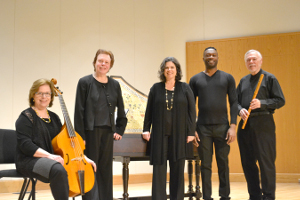On May Day, in Hill Hall, the Chapel Hill Philharmonia presented a marvelous young artist in two works by Mozart, together with music by Dvorák and Tchaikovsky. The ensemble’s conductor is UNC clarinetist Donald L. Oehler, a fine teacher and an experienced chamber musician with a solid baton technique. Under his leadership, this community orchestra has made great progress. In its early years, it was known as the Village Orchestra, and its concerts, billed as “open public rehearsals,” were often given in the band room. The group, which now has around 65 members and whose section-heads are professionally-trained artists, drew a substantial and responsive crowd for its spring program.
The concert opened with a pair of Dvorák’s Op. 72 Slavonic Dances, the first of which (No. 7) took off like a bat out of a very warm place, which Hill Hall is, at this time of year. Once underway, the playing was bracing, and the ensemble was reasonably tight. The Second Slavonic Dance, generally slower and more reflective, was a bit less successful, but the string sound remained rich and vibrant (this orchestra boasts eleven cellists), and the spirit was consistently right, even when the collective flesh wavered slightly.
Solo violinist Maia Cabeza soared in her Mozart selections. The lovely Adagio, K.261, was remarkable in every respect. The young artist, who studies with UNC’s Richard Luby, and who is all of ten years old, possesses amazing poise, secure technique, and musical understanding that would not necessarily be expected in players twice her age (or more). Oehler tended to balances like a hawk observing his next meal, and the orchestra itself played grandly. There was more of the same in the better-known Rondo, K.373, which made for an altogether felicitous paring with K.261. Given Cabeza’s playing and the strong support she enjoyed, these were not merely excellent readings – they were outstanding. At the end, the soloist received an ovation and two large bouquets which, when clutched together with her violin, blocked off a large portion of her person from the audience’s view!
Cabeza was selected during the orchestra’s annual concerto competition, which (we understand) drew a fairly large field of applicants. The program notes contained a brief bio that revealed that Cabeza was born in Japan, lived in Canada, and moved to Chapel Hill two years ago. She’ll be attending the Greenwood Music Camp this summer (one of the leaders of which is Ciompi Quartet violist Jonathan Bagg’s mother). Cabeza is a fifth grader at Glenwood Elementary School.
The program ended with Tchaikovsky’s Fifth Symphony, a work often avoided by jaded critics (and some other experienced concert-goers). I was however reminded not long ago that in the audience for every reading of a warhorse there are people who are hearing it for the first time – and for the last. In this case, the performance had a lot going for it. The string sound remained lush, and although the horns and low brass were sometimes too prominent (particularly when things didn’t run altogether smoothly for them), balances were generally fine. This was not a subtle performance, and in spots it was a bit unsettled, but the dynamics were nicely shaded, and there was plenty of atmosphere and drama. At the end, there was yet another ovation from the crowd. Clearly, the Chapel Hill Philharmonia is on the right track.











